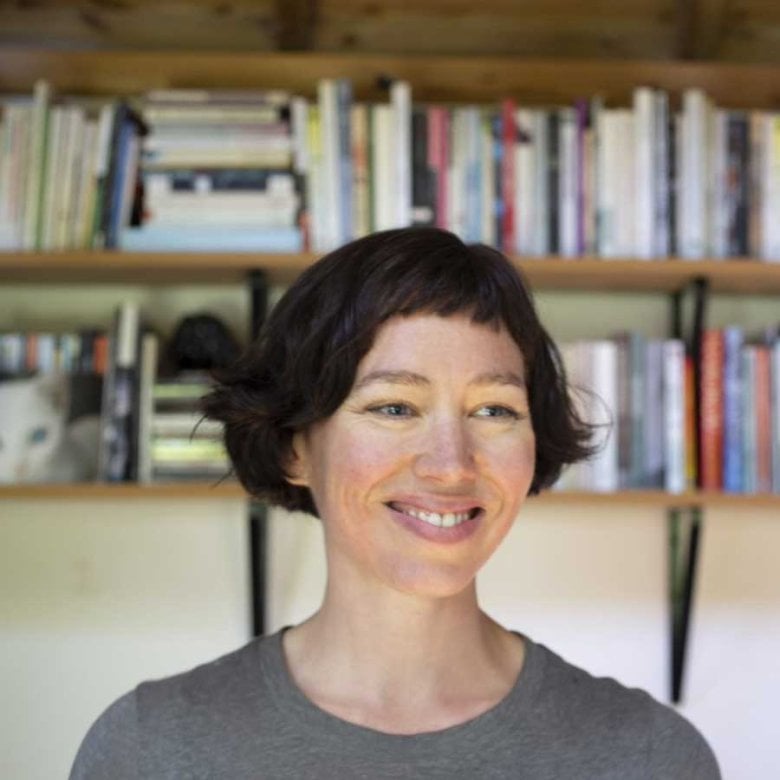Why art matters in 2023: in conversation with Josie Cockram
30 March 2023

Josie Cockram is an artist, contemporary art curator and course leader on Falmouth’s online master’s degree in Fine Art. Trained in sculpture and with a practice grounded in the discipline, she also works with sound, moving image, drawing, photography and installation.
However; it wasn't until her thirties that Josie went to art school. After a decade-long career as a youth worker, she discovered her vocation for artmaking in the pages of a novel.
“While studying literature at Cardiff University, I was writing an essay about the agency of art in George Eliot’s Middlemarch. There’s a section in the story where Dorothea, the protagonist, has an encounter with a classical Greek sculpture in the Vatican in Rome. That’s when I realised that I should be making or writing about art, rather than writing about literature about art”, she tells us.
Her life as an artist began in Cornwall when she enrolled at Falmouth on a part-time foundation course, before moving to London to study at Camberwell College of Art and later the Royal Academy of Arts. Now, living on the edge of Dartmoor, she has returned to lead Falmouth’s online master's degree in Fine Art. “I’m interested in how we make connections between major cities - cultural centres for contemporary art - and other locations in the UK and across the world; how we can sustain lives as artists, but also how we engage people across all our communities.”
Whether it's climate change or social change, it is important to think about how we live in a globalised culture – how we acknowledge difference while seeking points of connection.
A south-westerner born and bred, after many years in London Josie was drawn back down south; a residency at Plymouth Arts Centre was followed by an exciting opportunity to work on Groundwork, a three-year programme of exhibitions and events presenting acclaimed international art works across Cornwall. As Josie reflects, “I was drawn to the project because of the ambition of its director Teresa Gleadowe. I wanted to spend time thinking about how to make art happen in a rural situation - to tune into and enliven connections between the local and the international.”
The capacity for art to help us think about how we live in conversation with each other, and with our environment, is more pressing than ever in current times. “Whether it's climate change or social change, it is important to think about how we live in a globalised culture – how we acknowledge difference while seeking points of connection”, Josie tells us.
“To give an example from the Groundwork project, we invited film director and video artist Steve McQueen to show one of his works which explored the challenging conditions of mining for coltan – a metal commonly used in mobile phones – in the Democratic Republic of the Congo. Presenting the work in Cornwall created an opportunity to consider contemporary labour conditions, excavation and trade in dialogue with Cornish mining history. Art is all about joining a conversation between different histories, cultures and landscapes.”
Since moving back to Devon in 2019, Josie has continued to develop these conversations through her own studio work and curatorial projects, including Aller Aller, a contemporary art programme founded on the Dartington Trust estate with her fellow artist Keiko Yamamoto.
Rather than spending all their time trying to find answers to questions, artists are instead looking for the questions.
Josie has ensured the importance of international networks in contemporary art is central to Falmouth’s online Fine Art MA. With a current cohort made up of students from almost every continent, the community draws on a rich array of different cultures, art histories and contexts, which is something that motivates Josie. “It is important to think about how we decolonise our curriculums and what it might mean to decentre knowledge. Wherever students are based, we are focused on helping them to think about the knowledge they bring to the course community – be that knowledge of place, culture, and language, or from other parts of their lives – and to activate that as part of their art practice”, she explains.
The issue of access to the arts is equally pressing to Josie, and for people who may for whatever reason find it difficult to access an on-campus course. Josie is excited by the prospect of the online master’s being more accessible. “Many of our students are not able to be near to an art school that's got the kind of history and ambition as Falmouth. Some have jobs or caring responsibilities, or it may better suit their learning style to study online; to work at their own pace and be part of conversations in a different way”, Josie shares.
It is the ability of artists to lead conversations through challenging times that Josie thinks is particularly valuable right now, as she explains: “Rather than spending all their time trying to find answers to questions, artists are instead looking for the questions. That sense of not knowing is central to art practice; it is a language that artists nurture and it is essential in the contingent world we live in.”




